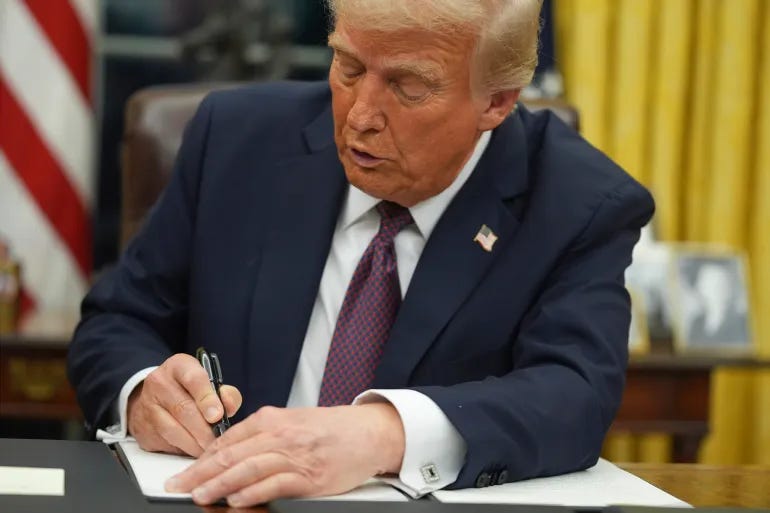Lawsuits Challenge Trump’s Executive Orders on Birthright Citizenship and Federal Workforce
Legal Battle Begins Over Trump’s Sweeping Executive Actions
Washington, DC – A legal showdown has erupted over U.S. President Donald Trump’s latest executive orders, with civil rights groups and state governments filing lawsuits against his efforts to overhaul birthright citizenship.
On Monday, the American Civil Liberties Union (ACLU) and the Legal Defense Fund spearheaded legal action, arguing that Trump’s directive to limit birthright citizenship is unconstitutional. The lawsuit is expected to put his executive authority to the test. Additionally, on Tuesday, 18 states filed a separate lawsuit challenging the order.
The legal actions mark the first in what is expected to be a series of challenges against the 26 executive orders Trump signed on his first day in office. His sweeping directives include declaring a national emergency at the southern border, dismantling federal diversity programs, and ending federal recognition of transgender identity. According to White House officials, these orders were among 42 presidential actions issued on Monday, encompassing memoranda and proclamations.
Legal and Constitutional Challenges
The primary point of contention is Trump’s attempt to deny citizenship to babies born on U.S. soil to undocumented parents or those on temporary work visas. The order instructs federal agencies to withhold official documents recognizing these children as U.S. citizens. Critics argue this violates the Fourteenth Amendment, which guarantees birthright citizenship.
“Birthright citizenship is enshrined in our Constitution and represents the essence of American values,” said Cody Wofsy, deputy director of the ACLU’s Immigrants’ Rights Project. “Stripping citizenship from children born in the U.S. is illegal, cruel, and un-American.”
California Attorney General Rob Bonta echoed this sentiment, vowing to fight Trump’s move in court. “This administration is starting its second term by attacking one of our most fundamental rights,” Bonta said. “I have one message for President Trump: I’ll see you in court.”
The Fourteenth Amendment, ratified in 1868, affirms that “all persons born or naturalized in the United States, and subject to the jurisdiction thereof, are citizens of the United States.” Trump’s executive order asserts that children born to undocumented parents or temporary visa holders do not meet the “subject to jurisdiction” requirement and should therefore be denied citizenship.
The ACLU and other legal experts argue this contradicts longstanding Supreme Court precedent. In an 1898 case, the Court ruled that children born in the U.S. to immigrant parents are entitled to citizenship.
“Birthright citizenship is a pillar of American democracy,” said Theo Oshiro, co-executive director of Make the Road New York, one of the plaintiff organizations. “This policy will deny fundamental rights to American-born children and erode the values of fairness and inclusivity.”
Implications for Affected Families
Opponents of Trump’s order warn that denying citizenship could have devastating consequences. Children stripped of U.S. citizenship would lose access to legal employment, passports, and government services. They would also face the threat of deportation, leading to psychological distress for families.
“This is not just a legal dispute,” Bonta added. “If this order stands, thousands of American-born children could suddenly find themselves stateless, deprived of basic rights and protections.”
Broader Legal Fallout
Trump’s legal challenges extend beyond birthright citizenship. On Monday, the National Treasury Employees Union (NTEU) sued the administration over an executive order making it easier to fire federal employees. NTEU President Doreen Greenwald called the order a political move that undermines civil service protections.
“This directive is designed to impose political loyalty tests on federal employees who swore an oath to uphold the Constitution,” Greenwald said in a statement.
Additionally, a lawsuit has been filed against the newly created Department of Government Efficiency (DOGE), a non-governmental agency established by Trump to reduce bureaucracy and spending. Billionaire Elon Musk was appointed to lead the department, but legal experts argue that DOGE functions as a federal advisory committee and must adhere to transparency and hiring regulations.
As the lawsuits mount, Trump’s executive orders face an uncertain future. The legal battles could significantly impact the scope of his presidential authority and reshape the legal interpretation of citizenship rights in the United States.


